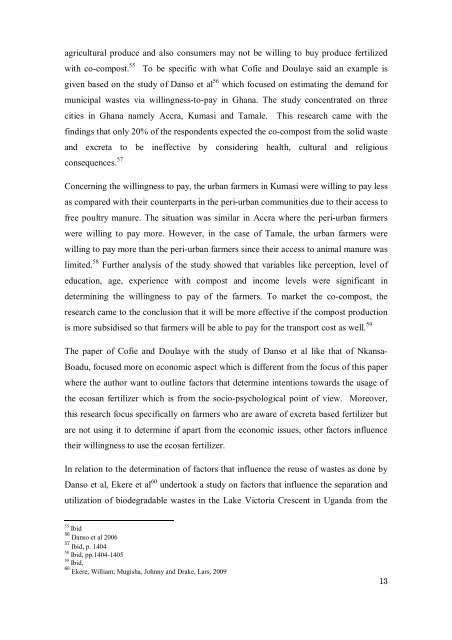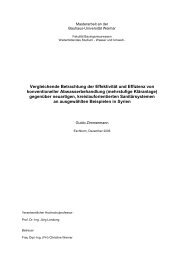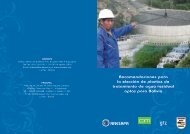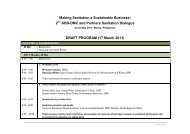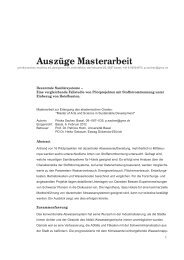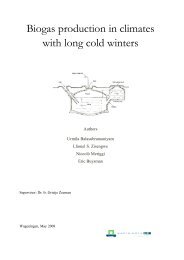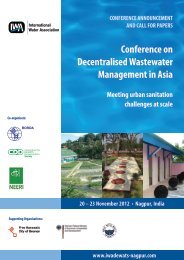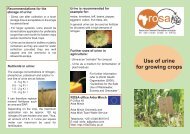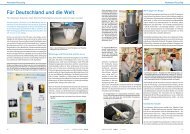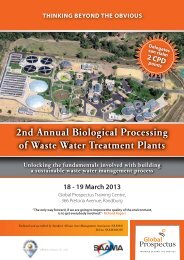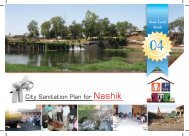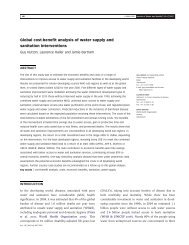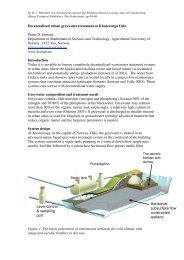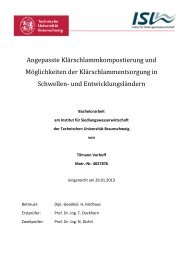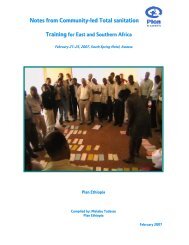A QUANTITATIVE APPROACH TO PREDICT ... - SuSanA
A QUANTITATIVE APPROACH TO PREDICT ... - SuSanA
A QUANTITATIVE APPROACH TO PREDICT ... - SuSanA
Create successful ePaper yourself
Turn your PDF publications into a flip-book with our unique Google optimized e-Paper software.
agricultural produce and also consumers may not be willing to buy produce fertilized<br />
with co-compost. 55 To be specific with what Cofie and Doulaye said an example is<br />
given based on the study of Danso et al 56 which focused on estimating the demand for<br />
municipal wastes via willingness-to-pay in Ghana. The study concentrated on three<br />
cities in Ghana namely Accra, Kumasi and Tamale. This research came with the<br />
findings that only 20% of the respondents expected the co-compost from the solid waste<br />
and excreta to be ineffective by considering health, cultural and religious<br />
consequences. 57<br />
Concerning the willingness to pay, the urban farmers in Kumasi were willing to pay less<br />
as compared with their counterparts in the peri-urban communities due to their access to<br />
free poultry manure. The situation was similar in Accra where the peri-urban farmers<br />
were willing to pay more. However, in the case of Tamale, the urban farmers were<br />
willing to pay more than the peri-urban farmers since their access to animal manure was<br />
limited. 58 Further analysis of the study showed that variables like perception, level of<br />
education, age, experience with compost and income levels were significant in<br />
determining the willingness to pay of the farmers. To market the co-compost, the<br />
research came to the conclusion that it will be more effective if the compost production<br />
is more subsidised so that farmers will be able to pay for the transport cost as well. 59<br />
The paper of Cofie and Doulaye with the study of Danso et al like that of Nkansa-<br />
Boadu, focused more on economic aspect which is different from the focus of this paper<br />
where the author want to outline factors that determine intentions towards the usage of<br />
the ecosan fertilizer which is from the socio-psychological point of view. Moreover,<br />
this research focus specifically on farmers who are aware of excreta based fertilizer but<br />
are not using it to determine if apart from the economic issues, other factors influence<br />
their willingness to use the ecosan fertilizer.<br />
In relation to the determination of factors that influence the reuse of wastes as done by<br />
Danso et al, Ekere et al 60 undertook a study on factors that influence the separation and<br />
utilization of biodegradable wastes in the Lake Victoria Crescent in Uganda from the<br />
55 Ibid<br />
56 Danso et al 2006<br />
57 Ibid, p. 1404<br />
58 Ibid, pp.1404-1405<br />
59 Ibid,<br />
60 Ekere, William; Mugisha, Johnny and Drake, Lars, 2009<br />
13


